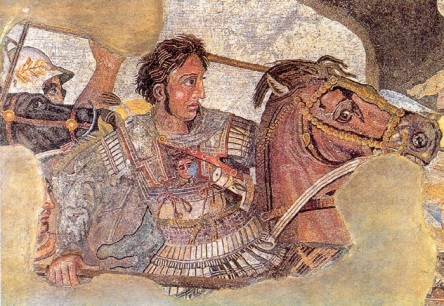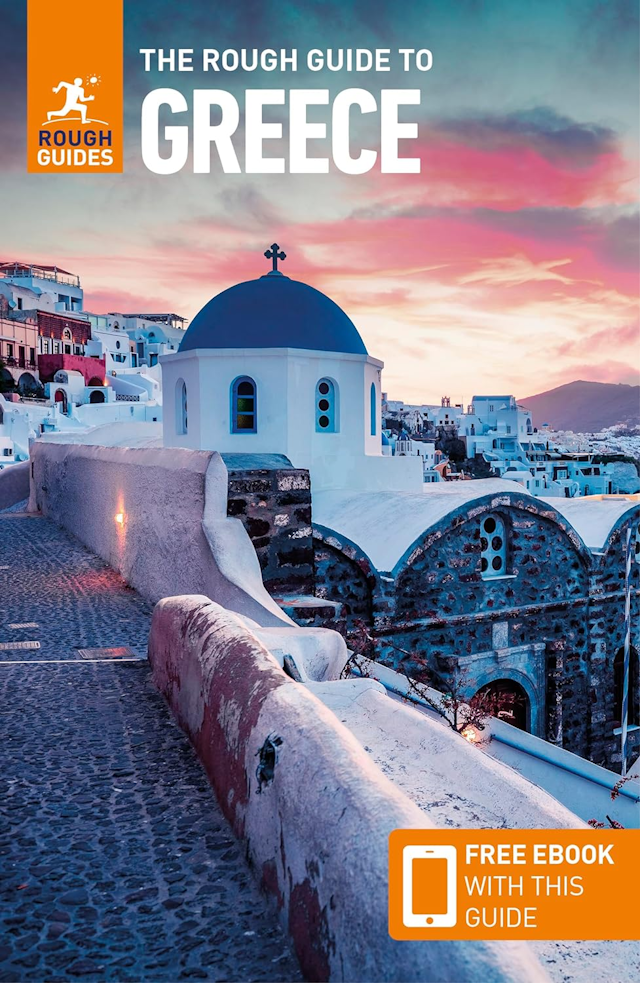- HOME
- Macedonia & Thrace
- Alexander the Great
Alexander the Great
Alexander the Great was the son of Philip II of Macedonia and gave Greece the greatest empire it has ever known.
Greece is rightly proud of the King of Macedonia, Alexander the Great (356-323 BC), as the Greek Empire was at its mightiest during his reign. By the time of his death his armies had conquered lands throughout the Middle and Near East, as far as the Punjab, and down into Egypt, where he founded the city of Alexandria and where he is somewhere thought to be buried – although he actually died in Babylon.
Philip of Macedonia
Alexander’s father, Philip II of Macedonia, was already extending his Empire and gave his son, who was born in Alexander the Great, the very best start in life. He had the finest teachers, including Aristotle, and he was commanding part of the Macedonian Army by the age of eighteen. Two years later his father Philip was assassinated as he prepared to invade Persia, and it cannot be certain that Alexander did not actually have a hand in this.
Alexander immediately took command of the Macedonian troops, and in 334 BC took an army of some 35,000 of them across the Hellespont (now the Dardanelles) and although outnumbered they defeated the Persian Army allegedly with the loss of only 110 of their own men. He had already swiftly put down rebellions in some of the Greek city-states, notably Thebes, which he burned to the ground.
From Persia he turned his attention to the Middle East, conquering Damascus, then Palestine, and finally marching into Egypt. Here he was welcomed for liberating the country from the Persians, and in 331 BC he founded Alexandria, having by this time complete control of the Eastern Mediterranean. Not satisfied with his, he headed for India, where he won more victories but at the cost of great numbers of men.
Alexander the Great, as depicted in the Alexander Mosaic
The Death of Alexander the Great
Alexander the Great was back in Babylon in 323 BC, turning his attentions to conquering more of Arabia and further west into North Africa, when he was taken ill with a fever after a banquet and died eleven days later. His body was taken in a gold casket to Alexandria, but his burial place has never been firmly established. Some recent archaeological digs claim to have found his tomb in the Egyptian desert, but without convincing proof.
Alexander the Great's Legacy
There is no doubt that Alexander was indeed one of the greatest leaders in history, noted for his tactical ability, his charisma in leading his men and inspiring bravery in his troops, and for his own bravery too. Like all such leaders, though, he had his ruthless side and didn’t hesitate to eliminate potential rivals just as swiftly and as brutally as he wiped out his enemies.
It is also said that he had a vision not merely to conquer the world but to unite both East and West in one large harmonious Empire. Certainly the cities he founded were all civilised and cultured places, and he fervently spread Greek culture and language while taking an interest in the cultures of the lands he conquered. He might well even be regarded as the most important Greek who ever lived.
Latest Posts
-
Study: Athens Among Best Cities for Family Science Trips
Athens is ranked as one of the top European cities for family science trips, according to a report by Ubuy, a global e-commerce platform. Ubuy’s new report reveals Europe’s top 20 cities where familie… -
May 1: Greece Labor Day Strikes to Halt Public Transport, Ferries
Transportation and travel in Greece will be disrupted on Wednesday, May 1, as public transport and ferry employees have announced their participation in strike mobilizations to mark May Day. According… -
Technopolis: New 3-day Beer Festival Coming to Athens in May
A new beer festival is coming to Athens and for three days will quench the thirst of beer lovers with well-known and rare labels from around the world as well as from Greek microbreweries. Lager? Pils… -
5 Reasons to Spend Easter in Meteora
Renowned for its spectacular “hanging” monasteries and reverent atmosphere, Meteora is the perfect place to spend Greek Easter. -
3 Must-Visit Islands for Greek Easter
Boasting spectacular landscapes and unique local traditions, the islands of Lesvos, Ikaria and Andros are ideal vacation destinations for Greek Easter. -
Easter Cookies from Smyrna, a 100-Year-Old Recipe
Discover the secret to making the most delicious Easter koulourakia (cookies) from Smyrna, passed down through five generations. -
Greece Launches Contactless ‘Tap & Pay’ System on Athens Airport Express Buses
The Greek Transport Ministry on Wednesday launched a pilot ‘Tap & Pay’ contactless payment system for passengers traveling on the express bus lines in Athens that connect to Athens International Airpo… -
Acropolis Museum Exhibition: The Parthenon and Byron
On the occasion of 200 years since Lord Byron’s death, the Acropolis Museum in Athens is honoring his memory with a symbolic exhibition related to Lord Elgin’s taking of the Parthenon sculptures. -
Greece Bans Sunbeds, Umbrellas, Bars on 198 Beaches
Sunbeds, umbrellas, and all sorts of constructions have been banned on 198 beaches across Greece according to a joint ministerial decision signed this week by Economy & Finance Minister Kostis Hatzida… -
4 Guesthouses in Zagori that Are Worth Visiting
Amidst the mountains and spectacular scenery, these four traditional guesthouses in the heart of Zagori, Epirus, offer the very best in Greek hospitality.













